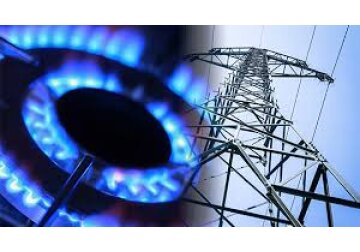
The cessation of supplies of cheap Russian gas to the left bank of the Dniester may lead to a significant increase in electricity prices in Moldova.
Experts of the German Economic Team Berlin Economics expressed this opinion, noting that in such a situation, strengthening energy sustainability and expanding the use of renewable energy sources and improving the electricity transmission infrastructure are crucial. The experts emphasized that since 2021, Moldova's energy sector has been facing serious problems, primarily due to dependence on cheap Russian gas and electricity supplies from the Transnistrian region. Although right-bank Moldova now buys natural gas at market prices from other countries, it still benefits from relatively cheap electricity supplied by left-bank Moldova through Moldavskaya GRES, which effectively utilizes essentially free Russian gas. However, the situation may change with the expiration of the gas transit agreement between Ukraine and Russia at the end of 2024, which could significantly raise gas prices for the Transnistrian region. To mitigate this risk and reduce its dependence on Moldavskaya GRES, Moldova is expanding its electricity generation capacity by promoting renewable energy through auctions and diversifying its electricity supply through closer integration with its neighbors. Berlin Economics experts point out that Moldova is heavily dependent on imports of natural gas and oil products to meet its energy needs. Until 2021, it received about 95% of its gas at low prices under long-term contracts with Russia's Gazprom. However, after the contract between Moldovagaz and Gazprom expired in 2021, right-bank Moldova began to diversify its natural gas suppliers, with contracts with Romanian, Greek, Hungarian, Polish, Swiss, and Austrian companies, and is currently pursuing gas deals with Turkey. Despite these efforts, Moldova's electricity supply still depends on relatively cheap electricity generated from Russian gas at Moldavskaya GRES in the Transnistrian region, which covers 70% to 80% of the electricity needs of the right bank of the Dniester. The Transnistrian region receives gas from Russia free of charge. This hidden subsidy is estimated by experts at an average of about 360 million euros per year from 2017 to 2021. This scheme allows the left bank of the Nistru/Dniester River to sell natural gas at very low tariffs to households and enterprises in the Transnistrian region, including Moldavskaya GRES. At the same time, Moldavskaya GRES uses this almost free gas to produce electricity at very low prices, which it then sells to right-bank Moldova at below-market prices. However, the gas transit contract between Ukraine and Gazprom, which currently provides free gas supply, expires in December 2024. Given Ukraine's announcement of a potential refusal to extend the contract, there is the potential for disruptions in gas supplies to the left bank of the Nistru/Dniester River, potentially affecting the electricity market on both banks. If the transit contract is completely terminated, Moldavskaya GRES (MGRES) will have to look for alternative sources. In order to analyze the economic consequences of the MGRES’ need to purchase natural gas at market prices, the German Economic Team (GET) conducted a scenario analysis to assess the possible impact on electricity prices in both right- and left-bank Moldova. To assess the impact on electricity prices for the whole of Moldova, two scenarios were worked out: a baseline scenario in which the left bank of the Dniester continues to receive almost free gas from Russia, and a market scenario in which MGRES purchases gas on the European market at market prices (monthly futures prices for 2024). In the baseline scenario, MGRES remains the main supplier of electricity to Moldova due to its highly profitable production (25-30 EUR/MWh). However, in the market scenario, when MGRES will be forced to buy gas at market prices due to the interruption of cheap Russian gas supplies, MGRES costs will increase significantly. This would significantly change the profile of electricity generation in Moldova, as imports from Romania would become more competitive than MGRES for all months. MGRES will then serve primarily as a peaking power plant when capacity is exhausted. This shift will lead to a significant increase in electricity tariffs: residential tariffs in the right bank Moldova will increase by 27%, and in the left bank - by 362%. Industrial tariffs on the left bank of the Nistru/Dniester River will increase by 412%, potentially jeopardizing the region's heavy industry. Overall, annual electricity costs in the country would increase by 333 million euros (+61%) compared to the baseline scenario. The impact on the right bank Moldova will be comparatively smaller due to initially higher tariffs. As GET experts note, while a complete cessation of Russian gas supplies represents an extreme scenario, alternatives such as renegotiating transit contracts through Ukraine should be considered, with Moldova potentially covering the costs. This could have a smaller impact on tariffs. Moldova is also expanding its generation and transmission capacity to reduce dependence on MGRES. A key project is the construction of the Vulcanesti-Chisinau transmission line, which will allow direct imports of electricity from Romania. This not only increases transmission capacity, but also bypasses Transnistrian territory, unlike existing transmission lines. However, its completion may be delayed beyond the originally planned 2025. In addition, the Balti-Suceava transmission line, designed to improve energy interconnection between Moldova and Romania, is expected to be completed by the end of 2027. In addition to improving transmission infrastructure, Moldova itself also has significant renewable energy potential from wind and solar sources. In 2024, the government will launch a tender auction system for 165 MW of renewable capacity, with the possibility of further expansion. However, effective integration of this potential requires the development of balancing infrastructure in right bank Moldova to minimize dependence on unpredictable energy imports from neighboring countries. GET experts point out in their conclusions that despite recent progress in stabilizing Moldova's energy sector, the termination of the gas transit agreement between Ukraine and Russia introduces uncertainty. At the extreme, the termination of cheap Russian gas supplies could lead to a significant increase in electricity prices in Moldova. Thus, building energy resilience remains crucial, and particular attention needs to be paid to increasing the use of renewable energy and improving transmission infrastructure. As Moldova moves towards EU membership, the importance of regional integration and renewable energy increases not only for energy security, but also for compliance with EU regulations. Compliance with EU carbon pricing mechanisms, such as the Emissions Trading System (ETS) and the Carbon Border Adjustment Mechanism (CBAM), will be important for the future of Moldova's energy sector and environmental sustainability. // 29.04.2024 – InfoMarket







